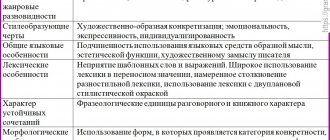Properties of public speaking
Various public speaking skills are developed in the process of relevant classes and trainings, and their manifestation is public speaking, which has the following basic properties:
1) special structure of speech , the relationship between linguistic and non-linguistic (facial expressions, gestures) means of persuading the audience;
2) the focus of the speech on obtaining a response from the listeners, since its goal is not simply conveying information, but persuasion;
3) effectiveness , depending on the psychological mood and state of the speaker, his authority in the eyes of the public.
Types of oratory
Rhetoric highlights the types of public speaking that you need to know in order to speak successfully in each specific situation.
Since oratory originated in Ancient Greece, there are outdated genera and types of oratory that have lost their meaning today.
The modern classification boils down to the following:
1) Socio-political oratory involves such forms of expression as a report on any economic, socio-political topics, diplomatic and political speech, agitation and rally speech, military-patriotic speech, as well as political review.
2) Academic oratory is distinguished by the presence of special terminology, a strict style of speech, argumentation, and logic, that is, it is scientific speech. This form presents such genres of oratory as a scientific report, lecture, message, review.
3) Judicial oratory is found in various trials and is distinguished by reasoning, objectivity, evidence, and sometimes has an evaluative nature. This type includes the following genres of oratory: accusatory speech, defensive speech.
4) Social and everyday oratory has several basic forms, and the oratorical techniques used in this type of eloquence reflect certain social, kinship, and family relationships. The most common types and types of oratorical speech of this type are anniversary, congratulatory, laudatory speech, toasts, memorial, funeral speech;
5) Theological-church oratory is represented by the oratorical genres of sermons and other church speeches. This type also has its own characteristics, expressed in the absence of argumentation, logic and evidence, and the content of the speech itself does not imply the need for the listed properties to be present in it, and the audience also does not expect the appearance of any arguments.
As a special variety, dialogical forms of oratory are distinguished, which are expressed in discussion, dialogue and polemics. They also have certain features associated with the need to influence a single interlocutor or several participants in the conversation.
In particular, the role of emotional and psychological techniques is significantly reduced, and the importance of argumentation increases, since there is no crowd.
Political rhetoric
1.1. Content-communicative need in the concept of public political communication
We live in a familiar world, where everyday life is inextricably linked with speech, which we use almost from birth. For the average person, speech is as natural and simple as in our minds the chirping or singing of a bird. But many people tense up, worry and blush when they have to speak “in public,” that is, when they feel other people paying attention to their speech. And then everything changes dramatically - natural “speaking” turns into a difficult and burdensome task. A person finds himself in a situation that transforms ordinary, uncontrolled speech into public, social speech.
Formally, it is very difficult to distinguish everyday speech from public speech. Why do almost all people, when transitioning to a public form of communication, experience difficulties and a sharp increase in tension? The answer is simple: we feel responsible to the people with whom we communicate publicly. We can say that we strain ourselves, voluntarily falling under the influence of stereotypes that control archetypes of behavior. But this is a superficial answer.
The deeper answer is much more complex. The laws of communication developed in animal form and regulate the hierarchical system of those reactions of a group of people on whom the fate of the corporation depends. Speech on an unconscious level is designed so as not to interfere with the leader’s realization of his superpowers when organizing a group, including in situations where instant decision-making is necessary.
With this approach to public speech, the tension that arises in the speaker is deeply justified. Its purpose is to block attempts by group members to reduce the level of managerial resources of the leader and limit his status. Each person giving a speech to an audience finds himself in the role of a leader for the duration of the speech.
We will call public speech a form of speech activity that is associated with the discussion of content that is relevant to a community at any level. Public speech is carried out by dividing the members of the corporation into speakers and listeners. Speakers gain the right to subjectivity, prominence, or attention in the space of communication. Listeners are required to act according to certain rules, contributing to the effectiveness of communication. Speakers are accountable to listeners for attempting to influence the fate of a corporation. Listeners have the right to join or reject the positions of the speakers. The end result of public communication is a decision that strengthens the corporation or is consistent with the common good.
If you try to comprehend the deep functionality of public speech and remember that for many years of human history, major decisions were made in the political space, then the essence of political communication will become clearer. We will understand political communication as a form of communication carried out in the space of political institutionalization, the content of which is to discuss problems and make decisions regarding the creation of a political system and its reproduction in the process of managing society. The main part of the decisions is related to the creation of norms regulating public life, as well as their implementation and control over their implementation.
Therefore, in the space of modern rhetoric, public communication is sufficient to understand a collective form of exchange of speech positions, carried out in accordance with certain rules and ritual. With this approach, it is possible to identify a variety of positions, both general linguistic and private, including positions in the space of political institutionalization.
Representatives of various branches of knowledge and sciences study various forms of communication processes and methods of their reproduction. One of these disciplines is rhetoric.
Rhetoric (Greek teche rhetorike) is the science of oratory, the relationship of thought to utterance and the means of rhetorical proof. Rhetoric is usually understood as a philological discipline that studies the relationship of thought to word. As a rule, in the space of rhetoric there is a distraction (abstraction) from the system of a particular language. The subject of the study is the structure of the linguistic personality of the sender of speech (speaker or communicator) and the recipient (recipient). In addition, rhetoric studies the speech technology of argumentation and methods of constructing an appropriate, proportionate statement.
In the modern world, the role of the impact of speech on a person is increasing. The media (media or mass media) influence minds, replacing political violence to one degree or another. This space of speech is focused on the specific result of the impact of communication on the consciousness and behavior of people. Modern linguopragmatics and neo-rhetorics study the impact of linguistic signs on humans. In a universal sense, rhetoric is the doctrine of the organization of the communicative subsystem of the integral system of modern culture.
Rhetoric as an applied discipline contains a set of theoretical provisions that are created in various fields of linguistic sciences, philosophy, logic, psychology, and semantics. In addition, rhetoric contains a set of rules, techniques, and regulations that enable the practical creation and delivery of speech that is culturally appropriate and influences people.
The theoretical aspects of rhetoric allow you to consciously and creatively engage in the construction of communication. Practical technologies help create texts that meet the goals of speech creators. These two sides of rhetoric enrich each other, and only their combination can allow a person to become an effective speaker.
Like any form of thought, rhetoric in society performs certain functions. These usually include:
− creation of norms of public communication and rhetorical argumentation that allow organizing communication sufficient to resolve corporate and cultural problems;
− influence on the formation of cultural communication space in various spheres of society; ensuring the reproduction of society as a whole and its substructures;
− determination of criteria for assessing the public activities of various actors, which make it possible to recruit the most worthy members of society into the cultural and organizational elite.
For several centuries, rhetoric has been divided into general and specific forms. General rhetoric studies how general communicative proportions organize a natural language, such as Russian or English. Particular rhetorics explore specific communicative areas, such as communication in political, legal, or scientific spaces. The laws of general rhetoric are universal in nature, while the laws of private rhetoric are special, clarifying the characteristics of specific types of speech on a general linguistic background. Therefore, we will pay attention to both the content of general rhetoric and political rhetoric in particular.
Public communication of a universal, i.e. specific and complete nature, serves as a collective way of making decisions about problems relevant to the corporation. Verbal communication also helps to carry out decisions made by community members. To realize these functions, it is necessary to create the appropriate content of speech and carry out communication. In this case, success will be ensured by following the laws of public communication or implementing a set of technologies, i.e., an algorithm for communicative interactions. The algorithm involves the implementation of a number of steps or operations, the totality of which will lead us to the expected result.
The standard form of a rhetorical algorithm can be represented in the following form:
− in the process of communication, people always exchange some kind of content. In order for this content to correspond to the purpose of communication, it must be selected and arranged in a certain way. For better understanding, it needs to be expressed in concentrated form in the form of a thesis. In rhetoric, this form of activity is called invention or conceptualization;
− since communication is impossible without influencing listeners, preparing a speech includes modeling the audience. The result of communication depends on the capabilities and expectations of the listeners. Any speaker creates the basis for the perception of speech, taking into account the resources of listeners regarding the effectiveness of communication.
− the content of the speech and the resources of the listeners allow the speaker to determine the strategy of the speech. Strategy usually includes setting a specific goal, formulating the problem space of speech, constructing a dominant thesis and position of the speaker. Adequate strategic planning and design of communication dramatically increases the effectiveness of communication;
− strategic configuration allows you to determine the tactical structure of communication. Tactical organization is aimed at creating motivation that ensures that listeners perceive the content. In addition, it is necessary to intensify the desire of listeners to accept the content and position of the speaker;
− the speaker can achieve his goal only if he communicates effectively with listeners in real time. To carry out such communication, it is necessary to organize a system of proportional projections of the speaker onto the listeners, and the listeners onto the speaker. Effective comfortable communication is one of the highest values of culture;
− to ensure effective communication, the speaker constantly monitors the state of the communication space. The organization of control and correction of communication in real time can be considered a criterion for the professionalism of a speaker;
- finally, the oratorical activity described above turns into empirical material that allows the speaker to improve his skills. Analysis of one’s own experience and the experience of other speakers allows each speaker to select the best examples of forms of communication and integrate them into their own communication system.
Political communication is based on an algorithm of a more rigid nature than general rhetoric. This is due to the higher level of relevance of this communication and its ideological nature. Political communication always represents the interaction of interests of the participants in communication.
In general, winning a political debate means acquiring additional resources that the defeated side is deprived of. Mutual gain as a result of communication is possible only if, when discussing a problem, resources are created that satisfy the needs of all participants in the discussion. Unfortunately, such a solution usually limits a third party who is not involved in the negotiations.
In general, the proposed algorithm, when implemented, increases the efficiency of any communication. Efficiency allows you to realize the goals of communication, satisfy the needs of listeners, and bring satisfaction to the speaker. In order for these principles to turn into sustainable patterns of organizational activity of the speaker, a lot of cognitive and practical work is required.
In modern knowledge, the important role of interpretation of any subject of knowledge and discussion has recently been comprehended. Interpretation gives a statement that represents and manifests an object a certain meaning. Moreover, there can be countless interpretations, and each of them allows one to realize one or another goal.
For example, listeners can be understood (interpreted) as an abstract set of listeners who need to be subordinated to the will of the speaker, and as members of a corporation who need to be convinced of something. Listeners can be interpreted as customers and consumers of communication services, whom the speaker must “serve,” or as members of a corporation on whom its future fate depends. The list of possible interpretations is open and inexhaustible, and each interpretation will give rise to specific speech goals, strategy, tactics and other communication parameters.
It is quite obvious that you can interpret not only the listeners, but also the speaker, the cultural and corporate environment, the conditions and goals of communication, attitudes towards the consequences of communication, ways to achieve the goal of communication, etc. With this approach to public communication, it becomes a complex and multifactorial system , which has an infinite number of modifications. The aphorism suggests itself: “Show me how you communicate, and I will tell you who you are.” What does this content mean for rhetoric and for the speaker?
Let us remind readers that there are currently three main rational strategies for organizing reasoning: monism, dualism and pluralism. The monistic model is based on the interpretation of the whole as the unfolding of a single substantial principle: for example, the statement that communication depends on the personality of the speaker. Dualism is characterized by an interpretation of the whole based on a dual principle: for example, the assertion that communication depends on the personality of the speaker and the composition of the audience. Pluralism, in turn, is based on multifactor modeling. The pluralistic model interprets an object as a system consisting of many elements. The properties and connection of elements organize the whole, and the whole, in turn, determines the properties and connection of elements that differ from their “natural” state. For example, the effectiveness of communication can be associated with the way of organizing verbal interaction, which we looked at a little earlier (it included seven communication factors).
The multifactor model of communication can be called the space of communication or the space of communication connections. The space of communication, by analogy with the physical one, consists of various communicative elements connected into a whole based on the motivation and goal setting of the speaker and the resources of the listeners. The communication space is an interpretation or model of the communication process that captures the various positions of the participants and the process of their connection and exchange of positions.
The space of communication, understood as a system of verbal and non-verbal exchange of opinions in the creation of knowledge, joint decisions or motivational attitudes, externally consists of people and words. We have already noted that some in the space of communication are speakers, others are listeners. In order for communication to be fruitful, it is necessary to carry out certain algorithms by both speakers and listeners. Depending on the purpose of communication and how it is realized, participants in communication can be understood and interpreted in different ways.
The speaker can be called a speaker, a subject of communication, an author, a speaker, an argumentator, a rhetorician, a creator of speech, an organizer of communicative space, a speech actor, a speaker, a herald, etc. In certain situations, these names can be synonymous and replace each other.
In the case of different interpretations of the role and substantive parameters of the speaker, these synonyms turn into definitions. The title begins to express specific content that characterizes the speaker. Thus, a speaker can be called any organizer of communication who implements his oratorical position in accordance with the proportions of completed, full-fledged communication.
An argumentator can be called a speaker, emphasizing his function as the creator of the argumentation of speech. An actor is a speaker who shows sufficient activity in communication and implements the processuality and completeness of communication. “Subject of communication” means almost the same thing. In this case, the active function of the participant in communication is emphasized. We will use various concepts that characterize the organizers of communication; the content of the concepts will be specifically defined in the text or will be clear from the context.
It is now important for us to understand that a participant in communication, having received from the corporation the right to become a subject of this public process, is obliged to implement it according to the laws of this part of the cultural space. The subject, as the organizer of communication, acts as a speaker: he is obliged to make his position clear to the listeners and realize the goal of communication that he has defined for himself. Moreover, the form and purpose of the speech must comply with certain standards characteristic of the corporation and the participants in the communication.
Listeners also perform certain functions and actively participate in the process of public communication. There are situations that fundamentally affect the fate of a corporation, and then the highest degree of activity and responsibility is required from listeners. In modern rhetoric, the listener is also called the consumer of speech, addressee, recipient, recipient of speech, correspondent, opponent, etc. Let us explain that recipients are the listeners to whom the argument is addressed; correspondents - listeners with whom feedback is established; opponents - listeners who evaluate and criticize the speaker’s position.
The role of speech recipients in political communication is especially important. This role is due to the fact that in political practice the image of a speaker has developed, striving to realize his party or personal goals at any cost. The active position of the listeners, turning communication into a dialogue, forces the creator of the speech to take into account the position and interests of the listeners as a partner. The more adequate the reaction of the opposition, the more “objective” the speaker’s position will be. The passivity, incompetence or bias of the opposition allows the speaker to take a position that is contrary to the interests of the opposing party. Such a situation often turns into a basis for making political decisions with the most negative consequences for the corporation. This position of listeners coincides with a subservient political culture. The main task of listeners is to perceive, comprehend the speaker’s position, and then accept it or reject it.
For example, the simplest form of informational communication is based on the fact that the creator of the speech, the speaker or speaker, presents information in a form accessible to listeners. Listeners, in turn, perceive, decode and process this information. Moreover, the positions of the listeners are created both by the speaker and by the listeners themselves. Information communication does not, as a rule, imply public tension and responsibility of the parties for realizing the goal of communication. In turn, communication is possible that influences the fate of the corporation, which requires preparedness, concentration of resources and responsibility from speakers and listeners.
The culture of public communication can be considered the preparedness of communication participants, as well as their readiness and ability to adequately respond to corporate problems, productively exchanging positions during the communication process.
A similar cultural system of interaction between speakers and listeners arose in ancient Greece. Let us briefly consider how the system of public communication developed in the past.











